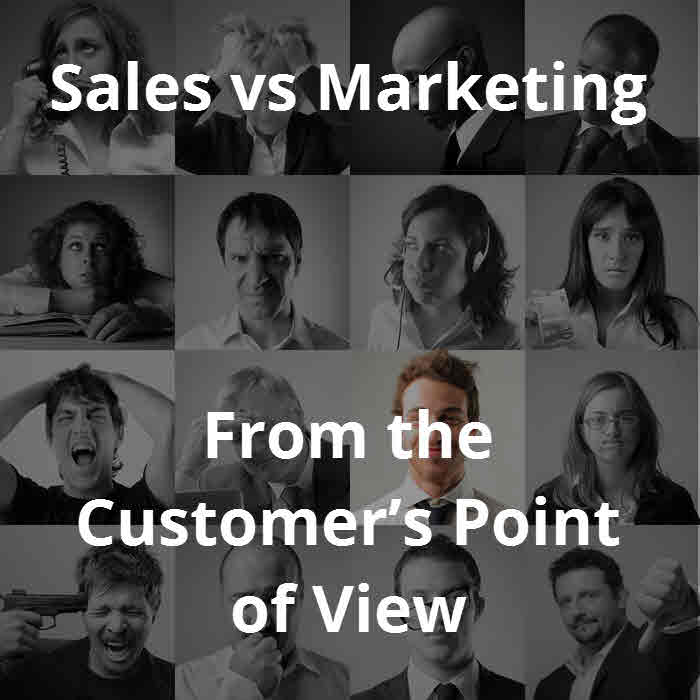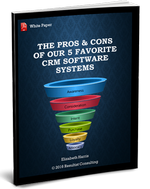
Customers have a unique perspective in the classic sales versus marketing battle because they are what both teams are fighting over. However, instead of feeling honored that both teams want to win their favor, the battle has a high probability of turning them off and driving them away.
Paradoxically, pulling on a customer from each side only serves to push them away from both.
Understanding and addressing this concept is integral to fixing it permanently, yet many organizations overlook the effect that fighting has on the end-user. As an external stakeholder, the customer is typically forgotten in the push to move the needle on revenue. The customer is simultaneously affected the most by in-fighting and focused on the least in a corporate analysis of the issue.
Uncovering what kind of a toll this fighting takes on a customer is akin to being able to interview the teddy bear that two children are crying over. But unlike a plush toy that can result in clenched fists and hurt feelings, the battle over credit for revenue can be a fatal blow to a company internally.
Ineffective Resources
One byproduct of the fighting between sales and marketing is the informational gap that occurs when one side assumes that it has the knowledge to provide data and resources to the other. The result is ineffective resources to answer customer questions and compel them to buy.
An article on Marketing Charts explains, “In a recent study, Altify found that while 61% of marketers felt their team was competent at delivering reasonable numbers of qualified sales opportunities, just 34% of salespeople agreed.” The mismatch between marketing’s perceived competency and the sales team’s opinion on the same topic highlights the tension festering. Reportedly, that friction is further amplified further down the pipeline as well with 68% of marketers believing that they understand what the sales team needs to succeed.
Unfortunately, the hubris on each side prevents both from developing the resources that customers rely on to inform their purchase decisions and avoid buyer’s regret afterwards.
Unclear Messaging
When sales and marketing fight, they often lose focus on both the product and the customer. The result is unclear messaging across departments and channels. When modern omnichannel consumers interact with a brand, they expect a seamless brand experience. Being met with muddled messaging can confuse customers and result in brand damage.
Distrust
Salespeople and marketers alike are quick to point fingers and call the other side liars. However, when they fight, customers lose confidence in both sides. Their distrust is not limited to one department – it is spread across the company in its entirety. This loss of trust in the customer relationship is the single biggest reason for decreased sales and stifled growth.
Distrust is even more apparent in situations where in-fighting creates competition so intense that consumers feel pressured or bullied into a sale. Being caught in the middle dissuades leads from buying, forces existing customers to find another provider, and encourages advocates to go silent.
Loneliness
A raging war between sales and marketing can only isolate customers. When the most important objective across an organization is bringing in more revenue to prove value, the customer becomes just another number and ceases to exist as a person. Sometimes this demotion in value is immediate after the sale is made, and other times it occurs after the onboarding process is complete. But either way, it is a deleterious effect of the fighting that is all too commonplace.
Toxicity
Year after year the top brands nationally and globally are companies that unite people around a feel-good mission or cause. But organizations that have in-fighting brewing cannot even connect employees around a central idea, which means that they are certainly unable to rally customers around their mission. Without a cohesive story or idea to drive their focus, brands can become toxic.
The blame for customers’ confusion, loneliness and distrust is difficult to place. The buyer’s journey will include both marketing and sales activities. Who is responsible for the success or failure of customer customers’ happiness?
One benefit a CRM software system offers is how it helps both the sales and marketing teams track activity and conversations. The best CRM software systems will provide a log over time and indicate where a potential customer becomes disinterested. This ensures that both the sales and marketing teams rely on one version of the truth. To help you choose the best, we have a white paper about our five favorite CRM software systems.
Get the free white paper here:
"The Pros and Cons of Our 5 Favorite CRM Software Systems"

